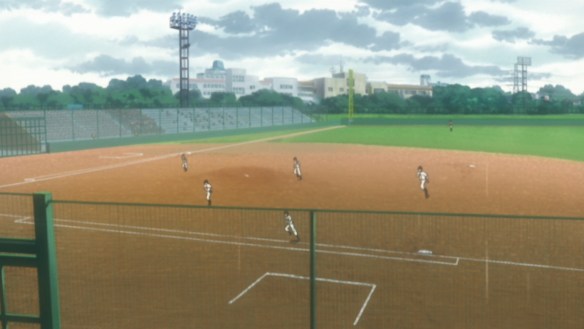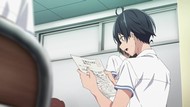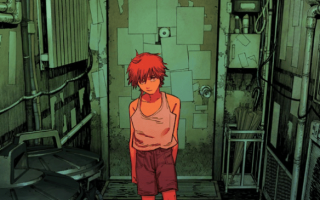Hello folks, and welcome back to Wrong Every Time. Today I am delighted to announce we’re returning to Big goddamn Windup, as our Nishiura boys charge into the fourth inning of their contest with Tosei, the returning summer tournament champions. So far our team has secured one precious early run, and have so far succeeded in defending that lead through Mihashi’s distinctive pitching. However, the storm clouds gathering overhead might well be an echo of Nishiura’s fortunes, as a team with every other advantage chips away at Nishiura’s crumbling element of surprise.
All of this has of course made for a rich, aromatic tactical stew served to us in the audience. Big Windup’s mixture of psychological analysis and game strategy was engaging even before we reached the field, and now the show is blooming into a vivid tactical simulator of impressive scope, factoring both the skills and mindsets of the various players into its ongoing drama so gracefully that it’s all parsable as a collective, coherent evolving conflict. Between the individual character reflections and the ongoing commentary of Abe, Momoe, and Tosei pitcher Takase, the knuckle-biting turning points of this conflict are apparent on both a micro and macro level, leaving us with the inescapable impression of Nishiura playing aboard a sinking ship, desperately attempting to secure runs before Tosei’s superior training shuts them out entirely. Let’s get to the game!
Episode 17
Yep, I’ve fully acclimated to our second OP at this point. You just can’t beat those yearning harmonicas for a sense of desperate, youthful struggle
The rain picks up to a persistent drizzle as we leave the third inning. It’s a classic yet effective device, using literal storm clouds to echo the fortunes of your protagonists, with the added threat here of a delay of game giving Tosei more time to develop countermeasures to Nishiura’s strengths. If Nishiura can’t finish this game before they’re essentially solved, it’s over
Director Tsutomu Mizushima was an excellent choice for adapting this show; he’s one of the most skillful directors I know of when it comes to convincingly articulating this sort of tactically grounded conflict, as ably demonstrated through Girls und Panzer and The Magnificent Kotobuki
Mihashi’s seven strikeouts seem to be bolstering his confidence, but are doing little to ameliorate his bird faces
We open the fourth inning with Hanai at bat. We’re in the second half of the batting order, but Hanai’s a reasonably confident batter; the challenge for this inning will be surviving long enough to cycle around to the top hitters, so they can get one more chance before Takase locks fully into professional form. As I said, the rain echoes the conflict well – the storm’s already commenced, but there’s still time to get a last run in
Some nice, brief cuts of animation for Takase’s pitch. Baseball feels like a sport that’s naturally pretty well-suited to animation, as most of the time the players on the field aren’t actually moving much, and the course of the ball’s movement around the field offers a natural guideline for the audience, directing their attention to wherever the key animation is happening
“I won’t say it to Mihashi, but it was quite natural we’d get strikeouts.” The strikeouts of the third inning actually worry Abe, as he correctly interprets them as Tosei essentially giving up that inning in order to get full data on Mihashi’s pitching. You can’t be fully observing a pitcher’s form while also attempting to hit their pitch, and Tosei clearly chose to observe over swinging in that last inning
Momoe motions Abe over to quietly discuss their mutual concerns. Abe describes Mihashi’s condition as “too good” – he’s so confident he’s liable to make mistakes. Self-confidence is good, but you also need a hunger for victory, and so far Mihashi’s “hunger for victory” has mostly been about proving his worth to his teammates. Now that he’s settling that insecurity, can he still commit fully to pitching?
“The fact is, humans just aren’t wired to conserve their energy well. And I’m afraid we’ll throw him off if we start messing with him…” An inevitability of competition at all but the highest level, and frankly maybe there as well – you can’t just manage your opponents, you also have to manage the unruly feelings of your teammates. Perhaps Mihashi’s in a reckless state of mind, but will telling him to calm down improve that, or only quench the confidence he’s currently bringing to his pitches? People aren’t rational, so your approach to coaching them must take their irrationality in mind
“You can give them one run at your discretion.” Momoe decides on an answer – a release valve, a run they can actually give up, both to get Mihashi into a competitive headspace and to challenge Tosei’s understanding of Mihashi’s style. If this sacrifice can both fix Mihashi and mislead Tosei, it’s worth it
Hanai is struck out, bringing us to first baseman Oki
Oki nearly takes the fastball, prompting catcher Kawai to reassess Nishiura’s batting order. If even their sixth batter can connect with the fastball, Takase can’t just throw his standard pitch and strike them all out with speed alone
God, Kawai is terrifying at gathering information! Oki just swinging as if it were a fastball at the second, obviously outside pitch tells him that Oki’s simply waiting for the fastball, which additionally informs him that Oki’s unusual first at-bat wasn’t his own idea, but an order from the coach. This in turn tells him both of Momoe’s strategic mind, and of the clear unity embodied by Nishiura’s tactics
Thus he now knows to look to Momoe for signaling. Between Kawai and Abe, it’s clear that catchers need to have a profound sense of overall awareness of the field
“We can’t match him after he advances the count. Batters lower in the rotation can only get a hit before the third pitch.” The strikes are a safety cushion, and to the batters who can’t follow Takase’s pitches, they’re basically the only chance to get a hit, when you can swing without fear of being struck out for it
Next up is Mizutani, who plans to wait for the slider he managed to hit before. As we see, now that Takase is warmed up, our less confident batters can only pray he throws the one pitch they’re prepped to hit. Not a great situation; they’ll be hemorrhaging outs constantly from here on
What’s worse, Kawai seems to have already realized this, and is furthermore learning to read Momoe’s signaling. So as long as he varies Takase’s pitches through the bottom half of the order, there’s basically no way these boys will connect
“I can’t tell the difference between fastballs and sliders!” We didn’t expect you to, Mizutani – that’s why you just always gotta take the same swing, counting on the statistics to lead you to a connection
“According to the data, eighty percent of the time, Kawai will waste a pitch when they’re two-and-oh.” This far ahead in the count, it’s logical to throw a bad pitch and try to get a free strike. Trust the data, don’t swing!
And Mizutani is out. Yeah, they’re doing a fantastic job of demonstrating what a desperate situation Nishiura is in, and how little the bottom half of their batting order can do against a top form Takase. His pitches are simply too fast for them to read, meaning they can only rely on statistical likelihoods of certain pitches and swing accordingly
“It can’t be helped if they can’t hit the money pitches. They’ve actually come a long way if they can take a serious crack at the first two pitches!” It was remarkable that Nishiura was able to look as strong as they did early on, given how woefully unprepared they actually are to face a pitcher like Takase
Outside the arena, we see Akimaru and Haruna discussing the weather as they prep for their own afternoon game
Even Nishiura’s own cheer squad are shocked to hear Mihashi described as “cool” by the stands. Yep, he’s apparently managed to nail that “cool” squawking baby bird look
Meanwhile, Tosei’s coach admonishes them for seeking big hits, telling them to just go for safe grounders and run up the score. They don’t need to demolish Nishiura, they just need to play solid, conventional baseball, and let their superior overall training and coordination do the rest. They need to start treating Nishiura as a real opponent, not a stage for stylish home runs
“Your opponent is a freshman. If you just stop swinging at balls, he’ll self-destruct on his own.” Almost certainly true – Mihashi’s confidence is fragile, and the moment the strikeouts stop, it will likely crumble
Another key quality a pitcher must develop – gaining the confidence to play just as well as before after a crippling mistake. If you spiral, the whole game spirals with you
One of Tosei’s players mentions Mihashi’s absurd ball control, to the extent that Abe never actually had to move his hand to catch the pitch, while another points out Momoe’s offensive signals. I love how this game is robust and resilient enough that you don’t really need to design clear “victory conditions” for the heroes – their opponents can actually be totally intelligent and making the best use of the available information as well, with practically no hidden information on either side. It’s far more satisfying to see your heroes overcome opponents you have total respect for, who don’t just fail because the narrative demands it so
The pitcher and catcher point out they’ve both clearly been researched, both in terms of pitch sequencing and visual tics. An unfortunate thing for Tosei to realize, as the pitching sequences are easy to adjust
The coach thus realizes it’s not his players’ fault they’ve been swinging at balls – they’ve been researched as well, their own proclivities spun against them. If the fifth position batter always favors just-outside balls, then give him what he thinks he wants
Ooh, I like this. The coach’s response to Mihashi’s breaking balls is to tell his batters to stand as far to the front of the batting box as possible, thus giving Mihashi’s pitches the least time to break. This will work precisely because Mihashi’s pitches are also slow, meaning they can be read in time even from the front of the box
Mashiba takes the plate as we return to the fourth inning, with Tosei now back at the beginning of their batting order
Based on him swinging at the first pitch of the game, Abe doesn’t respect his judgment. The lead-off is supposed to gather data for his teammates, and there’s nothing that disgusts Abe more than someone betraying their role in the larger team unit – one of Abe’s own blind spots, obviously owing to his middle school experience
Mashiba bunts it and takes first, demonstrating that he’s lead-off because his running speed easily gets a man on base, where his speed is even more valuable
Mihashi (or Abe, realistically) smartly pressures Mashiba with pick-off attempts, refusing to let him antagonize the team by threatening a base steal
And yet Mashiba is so fast he’s still able to take the steal. Abe thus decides this is the sacrifice – they cannot stop Mashiba, they simply have to stop more runners from getting on base. The real threat is that the cleanup hitter arrives at bat with multiple runners ready to score
Their second batter bunts as well, pushing the runner forward with a sacrifice play. Their coach’s words have clearly been taken to heart – they’re playing scrappily now, like they’re the underdogs, collaborating readily and eager to snag whatever runs they can steal
For their third batter, Abe is so determined to direct his swing that he actually calls for two balls first, to all the more assure the batter that the next pitch is a strike
Unfortunately, the opposing coach spies their plan, and sees they’re most concerned about not allowing another man on base. Thus he directs the batter to change his position just before the pitch, hitting a grounder to the left and potentially jeopardizing the third base runner, but thereby ensuring he himself gets on base. The plan works, and Tosei ends up with runners on first and third
“I don’t like them to be so modest!” Momoe is not excited about this new, no-frills Tosei style
Quite charmed by how Mihashi is just accidentally psyching out the third base runner by constantly making eye contact with him. Mihashi’s just awkward that way, but the runner feels like he’s being called out somehow
With a runner on third, the pressure to defend home is too great to stop the first base runner from stealing second. Thus we’ve got runners on second and third
A bunt! But Mihashi can grab it! But the dirt’s become mud, it’s not rolling! Mihashi’s still going for it! He throws to Abe! HE’S OUT!!!
And Done
Eeaaagh this show is bad for my heart! What the fuck was that claustrophobic sequence there, with runners swarming the bases like a pack of wolves, and Abe’s calculations desperately shifting from “no runs” to “allow them one” to “please at least limit them to one.” That last act was a feast of well-earned tension, elaborating the danger of an errant runner clearly through Mashiba’s performance, and then tightening the screws one beat at a time as Tosei continued to outmaneuver Abe and Momoe’s strategies. This episode in general did a marvelous job of demonstrating Tosei’s turnaround, offering intelligent counterpoints to Nishiura’s techniques, and then forcing our team to scramble as their weaker fundamentals put them further and further behind. Without giving Tosei a single run, Big Windup has engineered a complete tonal reversal, putting Nishiura in such a tangibly desperate situation that Mihashi’s wild sprint for that bunt actually felt like a fresh breath after nearly drowning. This is one hell of a game!
This article was made possible by reader support. Thank you all for all that you do.




